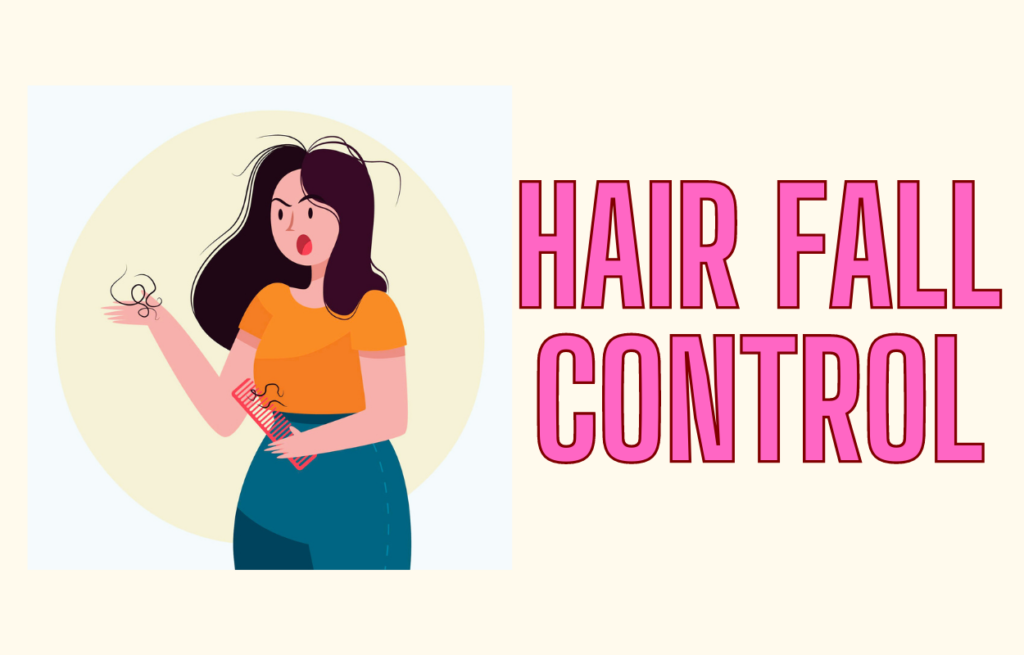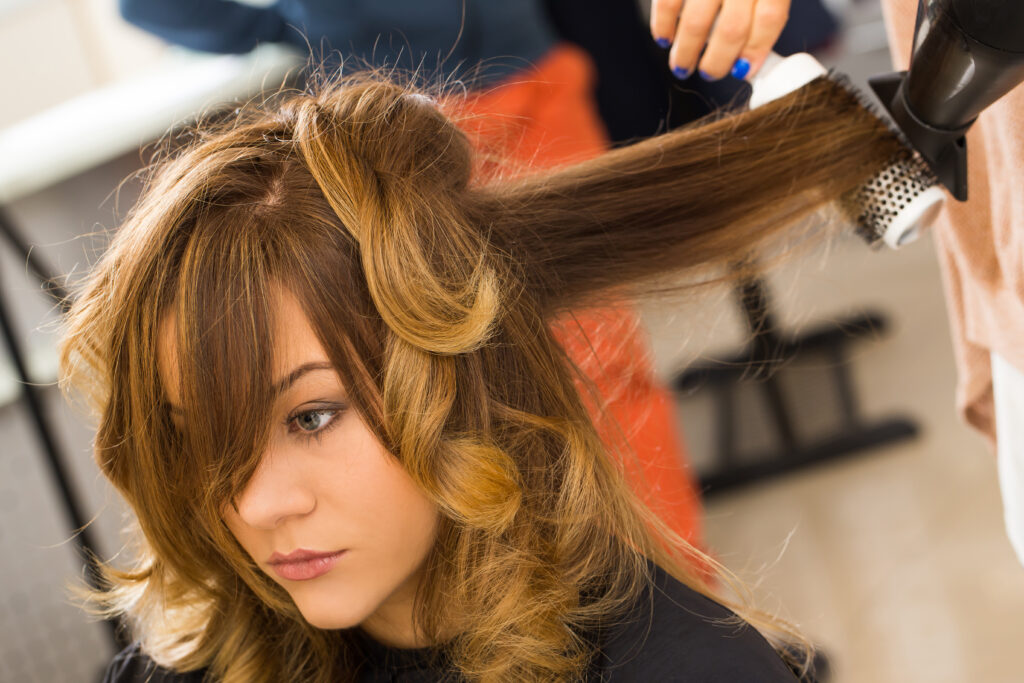Hair fall is a normal concern that impacts many individuals, regularly impelling strain and dissatisfaction. Anyway, with the right data and approach, settling this issue and advance better, more grounded hair is utilitarian.

Table of Contents : Hair Fall Control
Introduction : Hair Fall Control
Hair fall is a typical worry for some individuals, and it very well may be troubling to see your valuable locks diminishing and dropping out. Notwithstanding, fortunately there are successful ways of controlling hair fall and advance better hair development. In this blog, we will dive into the reasons for hair fall, fundamental tips to forestall it, and normal solutions for reestablish your hair’s imperativeness.
Understanding Hair Fall
Hair fall is a common issue that affects both men and women, leading to concerns about thinning hair and receding hairlines. Understanding the underlying causes of hair fall is essential for implementing effective hair fall control measures. Let’s explore the various factors that contribute to hair fall:
1. Hormonal Imbalances
Hormonal changes can altogether influence hair wellbeing. Conditions like polycystic ovary disorder (PCOS), thyroid problems, and hormonal variances because of pregnancy or menopause can prompt expanded hair fall.
2. Nutritional Deficiencies
An absence of fundamental supplements in the eating regimen can debilitate hair follicles and result in hair fall. Lacks in nutrients (particularly biotin, vitamin D, and vitamin E), minerals (like iron and zinc), and proteins can unfavorably influence hair wellbeing.
3. Scalp Conditions
Certain scalp conditions like dandruff, psoriasis, and seborrheic dermatitis can cause scalp aggravation and irritation, prompting hair fall. Legitimate scalp care is essential to forestall unreasonable hair shedding.
4. Stress and Anxiety
Persistent pressure can upset the hair development cycle and drive hair follicles into a resting stage, bringing about expanded hair fall. Overseeing pressure through unwinding procedures is gainful for hair wellbeing.

5. Genetics
Family ancestry assumes a critical part in deciding hair wellbeing. If you have a family history of hair loss or pattern baldness, you may be genetically predisposed to experience hair fall.
6. Medical Conditions and Medications
Basic ailments like alopecia areata, contagious diseases, or symptoms of specific meds can set off hair fall. Counseling a medical care proficient is fundamental for address these issues.
7. Excessive Heat Styling
Frequent use of heat styling tools like flat irons, curling wands, and blow dryers can damage the hair shaft and lead to breakage, contributing to hair fall.

8. Tight Hairstyles
Hairstyles that pull the hair tightly, such as braids, ponytails, or buns, can stress the hair follicles and cause traction alopecia, a form of hair loss.
9. Age
As we age, the rate of hair growth slows down, and the hair may become thinner. It’s a natural part of the aging process and may lead to hair fall.
10. Environmental Factors
Exposure to environmental pollutants, UV radiation, and harsh weather conditions can damage the hair cuticle and contribute to hair fall.
11. Hormonal Birth Control
Some hormonal birth control methods can lead to fluctuations in hormone levels, which may trigger hair fall in some individuals.
12. Sudden Weight Loss
Fast and huge weight reduction, frequently connected with crash eats less, can stun the body and lead to brief going bald.
13. Overprocessing
Frequent use of harsh chemical treatments like hair dyes, perms, and relaxers can weaken the hair and cause breakage.
14. Poor Hair Care Practices
Improper hair care, including infrequent washing, rough towel drying, and using the wrong hair products, can contribute to hair fall.
15. Autoimmune Disorders
Certain autoimmune disorders can mistakenly attack hair follicles, leading to hair loss.
Tips for Hair Fall Control
1. Feed Your Body with a Fair Eating routine for Hair Fall Control
An in any event, eating routine is the preparation of sound hair. Ensure that your meals consolidate different enhancement rich food sources, as leafy greens, brilliant vegetables, regular items, whole grains, lean proteins, and sound fats. Key enhancements like biotin, iron, zinc, and supplements A, C, and E are particularly significant for propelling hair improvement and decreasing hair fall.
2. Keep Your Scalp Clean and Healthy
A clean and healthy scalp creates a conducive environment for hair growth. Use a mild shampoo and conditioner suitable for your hair type to cleanse your scalp regularly. Avoid harsh chemicals that can damage your hair and scalp.
3. Regular Oil Massages for Hair Fall Control
Work your scalp with typical oils like coconut, almond, or castor oil. Working not simply further creates blood stream to the hair follicles yet moreover upholds them, diminishing hair fall and propelling hair advancement. Warm the oil fairly preceding applying it to your scalp for better maintenance.
4. Say No to Heat Styling
Excessive use of heat styling tools like straighteners and curling irons can lead to hair breakage and damage. Embrace your natural hair texture and limit the use of heat styling to prevent hair fall.
5. Manage Stress for Hair Fall Control
Stress can take a toll on your hair health, contributing to increased hair fall. Engage in stress-reducing activities such as yoga, meditation, or spending time in nature to promote overall well-being and hair health.
6. Avoid Tight Hairstyles
Hairstyles that pull your hair tightly, such as tight ponytails or braids, can stress your hair follicles and lead to hair fall. Pick free hairdos that put less strain on your hair.
7. Incorporate Aloe Vera
Aloe vera has natural nourishing properties that benefit your hair. Applying fresh aloe vera gel to your scalp can soothe irritation, reduce dandruff, and promote hair growth, helping in hair fall control.
8. Trim Regularly
Regular trims prevent split ends and breakage, keeping your hair healthy and reducing hair fall. Visit your hairstylist every few months for a quick trim.
9. Stay Hydrated for Hair Fall Control
Proper hydration is vital for hair health. Drink an adequate amount of water daily to keep your hair hydrated and maintain its strength and shine.
10. Choose Gentle Hair Care Products
Opt for hair care products that are free from harsh chemicals like sulfates and parabens. Gentle formulations protect your hair and scalp, minimizing hair fall.
11. Herbal Rinses
Herbal rinses using ingredients like rosemary, chamomile, or hibiscus can nourish and strengthen your hair, making it less prone to breakage and hair fall.
12. Avoid Overbrushing to Hair Fall Control
Brushing your hair excessively can damage the hair shaft and weaken the roots, leading to hair fall. Be gentle while brushing, especially when your hair is wet and more susceptible to breakage.
13. Shield Your Hair from Environmental Damage
Protect your hair from the harmful effects of the sun and pollution by wearing a scarf or a hat when you’re exposed to harsh weather conditions.
14. Engage in Regular Physical Activity
Regular exercise improves blood circulation, ensuring that essential nutrients reach your hair follicles, supporting healthy hair growth and reducing hair fall.
Conclusion : Hair Fall Control
Hair fall control is conceivable with a blend of solid way of life decisions and legitimate hair care rehearses. By sustaining your body with a reasonable eating routine, keeping a perfect and solid scalp, utilizing regular cures, and diminishing pressure, you can limit hair fall and appreciate more grounded, more dynamic hair. Keep in mind, consistency and persistence are critical to accomplishing durable outcomes. Embrace the excellence of your hair and do whatever it may take to keep it solid and delicious.
FAQs (Frequently Asked Questions) – Hair Fall Control
- Q: Can stress lead to hair fall? A: Yes, chronic stress can disrupt the hair growth cycle and contribute to hair fall.
- Q: Are there any specific foods that help in hair fall control? A: Foods rich in iron, biotin, and omega-3 fatty acids are beneficial for hair health.
- Q: Is hair fall more common in men or women? A: Hair fall affects both men and women, but the underlying causes may differ.
- Q: Can I control hair fall naturally without using medications? A: Yes, many natural remedies can effectively control hair fall without the need for medications.
- Q: How long does it take to see results from hair fall control measures? A: Results may vary, but with consistent efforts, you can notice improvements in a few weeks to a few months.

Thank you for your sharing. I am worried that I lack creative ideas. It is your article that makes me full of hope. Thank you. But, I have a question, can you help me?
Thank you for your sharing. I am worried that I lack creative ideas. It is your article that makes me full of hope. Thank you. But, I have a question, can you help me?